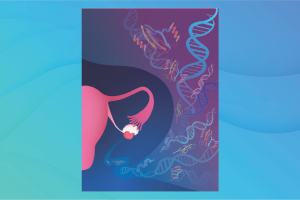
The following was originally published by Johns Hopkins Medicine newsroom.
A blood test that uses artificial intelligence (AI) to detect cancer-related genetic changes and protein biomarkers could help screen women for early signs of ovarian cancer, according to a study by researchers at the Johns Hopkins Kimmel Cancer Center in collaboration with several other institutions in the United States and Europe.
The study, published Sept. 30 in the journal Cancer Discovery, a journal of the American Association for Cancer Research, used AI-powered analyses of DNA fragments and two protein biomarkers to identify women with ovarian cancer. The two protein biomarkers, called cancer antigen 125 (CA-125) and human epididymis protein 4 (HE4), were previously identified as ovarian cancer biomarkers but, on their own, could not reliably detect ovarian cancer. However, combining these biomarkers with AI-driven detection of cancer-associated patterns of DNA fragments in the circulation improved screening accuracy and helped distinguish cancerous tumors from benign growths.
“The combination of artificial intelligence, cell-free DNA fragmentomes and a pair of protein biomarkers in a simple blood test improved detection of ovarian cancer even in patients with early-stage disease,” says Victor E. Velculescu, M.D., Ph.D., senior author of the study, professor of oncology, and co-director of the Cancer Genetics and Epigenetics Program at the Johns Hopkins Kimmel Cancer Center. “This AI-enabled approach has the potential to be an affordable, accessible method for widespread screening for ovarian cancer.”
Ovarian cancer is the fifth most common cause of cancer deaths among women in the United States, with a five-year survival rate of approximately 50%, according to the Centers for Disease Control and Prevention (CDC).
“Early detection of ovarian cancer may save lives but most women are diagnosed late in the course of the disease when survival rates are much lower,” explains co-first author Jamie Medina, Ph.D., postdoctoral fellow at the Johns Hopkins Kimmel Cancer Center. “The lack of specific symptoms early in the course of the disease or effective biomarkers has hindered earlier detection efforts.”
The investigators previously demonstrated that the AI-powered DELFI (DNA Evaluation of Fragments for early Interception) test method utilizes a new approach for liquid biopsies, called fragmentomics, that improves detection of DNA fragments in the blood and effectively detects lung cancer. The technology takes advantage of the fact that DNA, neatly packaged in healthy cells, becomes disorganized in cancer cells. When healthy cells die and break apart, they leave behind a predictable, orderly set of DNA fragments in the blood. However, when cancer cells die and break apart, the DNA fragments left behind are irregular and chaotic.
The latest study used blood samples from 94 women with ovarian cancer, 203 women with benign ovarian tumors, and 182 women without any known ovarian growths. The study population used to develop the approach comprised women treated at hospitals in the Netherlands and Denmark. The researchers used the DELFI-Pro test, which combines AI-powered cell-free DNA analysis with tests for CA-125 and HE4, to analyze the samples for ovarian cancer screening. DELFI-Pro was able to detect substantially more cases of ovarian cancer than tests for either protein alone, and it did so with almost no false positives. In fact, it detected 72%, 69%, 87%, and 100% of ovarian cancer cases stages I–IV, respectively, while at the same specificity, CA-125 alone detected 34%, 62%, 63%, and 100% of ovarian cancers for stages I–IV.
To confirm the results, the researchers used the test in a second sample of American women that included 40 patients with ovarian cancer, 50 patients with benign ovarian growths, and 22 without known ovarian lesions. Even in this smaller sample, the test achieved similar success rates, with 73% of all cancers detected and 81% of the high-grade serous ovarian carcinoma, the most aggressive form of the disease, with almost no false positives in women without cancer. The DELFI-Pro test was also able to effectively distinguish between benign growths and cancerous tumors — something ultrasound exams cannot.
“Ovarian cancers have a unique DNA fragmentation signature that is not present in benign lesions,” says Akshaya Annapragada, co-first author and an M.D./Ph.D. student at the Johns Hopkins University School of Medicine. Being able to distinguish benign from cancerous ovarian growth is important because the next step in cancer screening for women with ovarian growths detected via ultrasound is exploratory surgery. Using the “liquid biopsy” tests could spare women with benign growths having to undergo unnecessary surgery.
Velculescu and his colleagues intend to validate the test’s utility in larger samples from randomized clinical trials but he found the current results encouraging: “This study provides further evidence demonstrating the benefit of genome-wide, cell-free DNA fragmentation and artificial intelligence to detect cancers with high accuracy. Our results show that that this combined approach has higher performance for screening than existing biomarkers.”